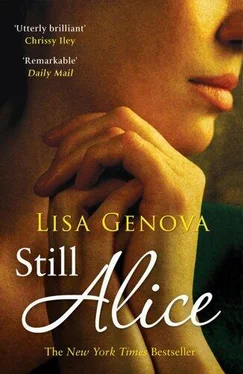4. "He refused to watch her take her medications. He could be midsentence, midconversation, but if she got out her plastic days-of-the-week pill dispenser, he left the room". Is John's reaction understandable? What might be the significance of his frequently fiddling with his wedding ring when Alice's health is discussed?
5. When Alice's three children, Anna, Tom, and Lydia, find out they can be tested for the genetic mutation that causes Alzheimer's, only Lydia decides she doesn't want to know. Why does she decline? Would you want to know if you had the gene?
6. Why is her mother's butterfly necklace so important to Alice? Is it only because she misses her mother? Does Alice feel a connection to butterflies beyond the necklace?
7. Alice decides she wants to spend her remaining time with her family and her books. Considering her devotion and passion for her work, why doesn't her research make the list of priorities? Does Alice most identify herself as a mother, wife, or scholar?
8. Were you surprised at Alice's plan to overdose on sleeping pills once her disease progressed to an advanced stage? Is this decision in character? Why does she make this difficult choice? If they found out, would her family approve?
9. As the symptoms worsen, Alice begins to feel as if she's living in one of Lydia's plays: "(Interior of Doctor's Office. The neurologist left the room. The husband spun his ring. The woman hoped for a cure.)". Is this thought process a sign of the disease, or does pretending it's not happening to her make it easier for Alice to deal with reality?
10. Do Alice's relationships with her children differ? Why does she read Lydia's diary? And does Lydia decide to attend college only to honor her mother?
11. Alice's mother and sister died when she was only a freshman in college, and yet Alice has to keep reminding herself they're not about to walk through the door. As the symptoms worsen, why does Alice think more about her mother and sister? Is it because her older memories are more accessible, she's thinking of happier times, or she's worried about her own mortality?
12. Alice and the members of her support group, Mary, Cathy, and Dan, all discuss how their reputations suffered prior to their diagnoses because people thought they were being difficult or possibly had substance abuse problems. Is preserving their legacies one of the biggest obstacles to people suffering from Alzheimer's disease? What examples are there of people still respecting Alice's wishes, and at what times is she ignored?
13. "One last sabbatical year together. She wouldn't trade that in for anything. Apparently, he would". Why does John decide to keep working? Is it fair for him to seek the job in New York considering Alice probably won't know her whereabouts by the time they move? Is he correct when he tells the children she would not want him to sacrifice his work?
14. Why does Lisa Genova choose to end the novel with John reading that Amylix, the medicine that Alice was taking, failed to stabilize Alzheimer's patients? Why does this news cause John to cry?
15. Alice's doctor tells her, "...you may not be the most reliable source of what's been going on". Yet, Lisa Genova chose to tell the story from Alice's point of view. As Alice's disease worsens, her perceptions indeed get less reliable. Why would the author choose to stay in Alice's perspective? What do we gain, and what do we lose?
Enhance Your Book Club
1. If you'd like to learn more about Alzheimer's or help those suffering from the disease, please visit www.actionalz.org or www.alz.org.
2. The Harvard University setting plays an important role in Still Alice. If you live in the Cambridge area, hold your meeting in one of the Harvard Square cafes. If not, you can take a virtual tour of the university at www.hno.harvard.edu/tour/guide.html.
3. In order to help her mother, Lydia makes a documentary of the Howlands' lives. Make one of your own family and then share the videos with the group.
4. To learn more about Still Alice or to get in touch with Lisa Genova, visit www.StillAlice.com.
A Conversation with Lisa Genova
What is Still Alice about?
Still Alice is about a young woman's descent into dementia through early-onset Alzheimer's disease. Alice is a fifty-year-old psychology professor at Harvard when she starts experiencing moments of forgetting and confusion. But, like most busy, professional people her age would, she at first attributes these signs to normal aging, too much stress, not enough sleep, and so on. But as things get worse, as things do with this disease, she eventually sees a neurologist and learns that she has early-onset Alzheimer's.
As Alice loses her ability to rely on her own thoughts and memories, as she loses her cerebral life at Harvard, where she'd placed all her worth and identity, she is forced to search for answers to questions like "Who am I now?" and "How do I matter?" As the disease worsens and continues to steal pieces of what she'd always thought of as her self, we see her discover that she is more than what she can remember.
What inspired you to write Still Alice ?
There were a few things, but the main one was my grandmother had Alzheimer's in her eighties. Looking back, I'm sure she'd had it for years before our family finally opened our eyes to it. There's a level of forgetting that's considered normal for aging grandparents, so you let a lot go by. By the time we were caring for her, she was pretty far along into the disease. And it hit us hard. She'd always been an intelligent, independent, vibrant, and active woman. And we watched this disease systematically disassemble her. She didn't know her kids' names, that she'd even had them (she had nine), where she lived, to go to the bathroom when she needed to, she didn't recognize her own face in the mirror. I used to watch her fuss over these plastic baby dolls as if they were real babies. It was heartbreaking. And yet, I also found it oddly fascinating. I was in graduate school at the time, getting my Ph.D. in neuroscience at Harvard. And so the neuroscientist in me wondered what was going on in her brain. We could see the results of the destruction on the outside. I wondered about the chains of events that were causing the destruction on the inside. And I wondered what it must be like when those parts of the brain that are responsible for your own awareness and identity are no longer accessible. I kept wondering: What is having Alzheimer's disease like from the point of view of the person with Alzheimer's? My grandmother was too far along to communicate an answer to this question, but someone with early-onset, in the early stages, would be able to. This was the seed for Still Alice.
Did your professional background help in the writing of Still Alice ?
Yes, it did. I think the most important way it helped was, over and over again, it gave me access to the right people to talk to. The Ph.D. in neuroscience from Harvard was like a golden, all-access pass. From the clinical side--the chief of neurology at Brigham and Women's Hospital in Boston, neuropsychological testing at Mass General, genetic counselors, caregiver support group leaders, and the world's thought leaders in Alzheimer's research, to the patient side--people living with disease and their caregivers, my professional background and credentials gave people the assurance they needed to feel comfortable letting me in and revealing what they know.
And, in my conversations with physicians and scientists, having an understanding of the molecular biology of this disease certainly gave me the knowledge and the vocabulary to ask the right kinds of questions and the ability to understand the implications of their answers.
Читать дальше












